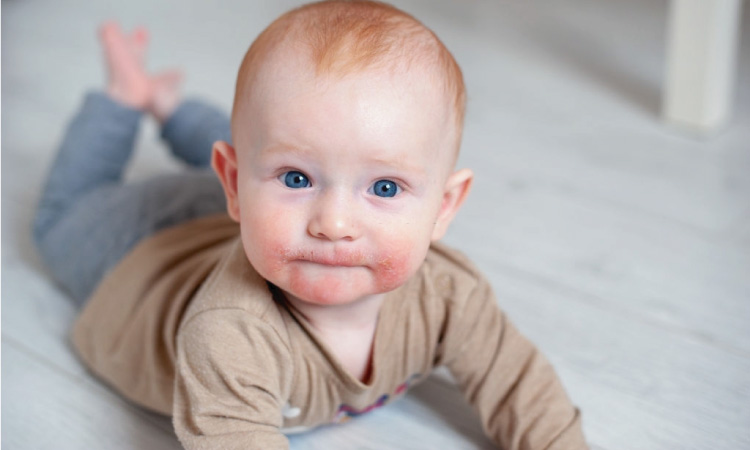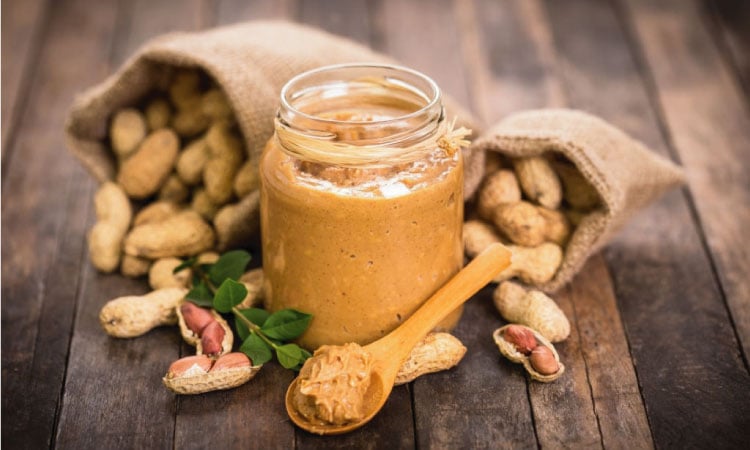Providing the baby with a nutritious and healthy diet is of the utmost concern for all parents. Once a baby has been introduced to solid foods, there are many options available. Peanut butter is a good option to add to a baby’s diet because it has a creamy texture, has many nutrients, and tastes delicious too. Peanut butter is tasty and filling at the same time. Despite some limitations, peanut butter for babies has many benefits which are worth considering.
What Is Peanut Butter?
Peanut butter is a rich and creamy butter that is made from ground and dry roasted peanuts. The peanuts are first roasted, and then blanched in hot water to remove the skins which can then be ground in a paste and a few oils can be added to enhance its texture as well as taste. Sometimes some chunks are added as well to make it crunchy as well to make it more delicious.
Peanut butter for babies is loaded with many nutrients and minerals and that makes it beneficial for your baby’s health. It is something that is liked by all. Since it is made with peanuts, it is a healthy option for all. It is not dense in calories. A great source of nourishment. It is on the list of foods for weight gain in toddlers and can also help in losing weight, depending on the quantity and time of intake.
Crunchy peanut butter for toddlers is a new variety and has small chunks of peanut which are loved by all the kids. So, peanut butter for babies can be creamy as well as crunchy. However, one should be more careful while giving crunchy peanut butter to babies due to the risk of choking.
Related Reading: 15 Most Common Unhealthy Foods For Toddlers
When To Introduce Peanut Butter To Babies?
It is undoubtedly good for babies to get peanut butter in their diet yet it is equally important to know the right time to start? And even to know how much peanut butter is too much for a toddler? These two questions are a common and in the minds of most of the parents. Since peanuts can cause allergies, parents are not too comfortable giving them to babies. So, it should only be given to babies when they are more than 10 months older.
Like any other food, peanut butter should always be introduced in little quantities so that one can see if there are any allergic reactions on the baby. Experts believe that children who have a family history of any allergies like eczema or eggs can have a higher rate of developing other allergies as well. They also advise starting giving peanut butter in the early stages of the baby so that no allergies are seen in the future. It is recommended to always take the doctor’s advice before introducing peanut butter to the baby.
Related Reading: 15 Easy To Make Finger Foods for Babies With No Teeth
How To Introduce Peanut Butter To Babies?

Even after consultation with the doctor to get the go-ahead for introducing peanut butter to the child’s diet, there are many other pointers that should be considered. It is important to have a look at the manner in which peanut butter is introduced to babies. Some important points before introducing peanut butter for kids are as below:
- This butter should be given in a diluted form by mixing a little hot water and forming a puree-like consistency. It should be given with a small spoon in very little quantity
- One should monitor the baby at an interval of 15-20 minutes for the coming 24 hours
- In case of any reactions, like rashes, hives, or breathing issues, the peanut butter should be stopped immediately
- Even if there are no reactions the first time, the quantity of peanut butter for babies should be very less
- One can test for allergy by just putting a small bite-size at the middle of the lower lip. The reaction will show instantly
6 Benefits of Peanut Butter For Toddlers
Peanut butter for babies is a full meal that offers a creamy, rich, and dense texture. There are several components in peanuts and peanut butter that are beneficial for brain development of the little ones.
According to the source, peanut butter is amazingly rich in vitamins like B3, B6, E, C. It is also loaded with folate and minerals like manganese, copper, magnesium, and potassium. Selenium, zinc, iron, and calcium are also found in a significant amount.
The benefits of peanut butter for toddlers are enlisted as below:
1. It is rich in arginine
Amino acids such as arginine aid in children’s growth. Growth velocity and linear growth are increased when arginine is obtained from food rather than supplements. In fact, growth rates will be higher than from general protein consumption. As a matter of fact, peanuts are one of the foods that contain the most arginine1.
2. Peanut butter is rich source of vitamin A
The homemade peanut butter for babies or one bought from a store is an excellent source of vitamins that are vital for a toddler’s growth. Since it is rich in vitamin A it is good for better eyesight.
3. It is a rich source of vitamin C
Vitamin C helps in building immunity that prevents kids from falling ill. Also helps in nourishing the skin.
Related Reading: When And How To Give Dalia To Babies?
4. Peanut butter contains vitamin K and calcium
Vitamin K content in peanut butter is 0.6 ug per 100g2. Being rich in calcium and vitamin K, peanut butter helps in the healthy development of bones in babies.
5. Excellent source of protein and dietary fiber
Two tablespoons of peanut butter contain around 8 grams of protein, along with two to three grams of fiber3. A baby’s protein intake increases his or her growth while fiber aids digestion and reduces constipation episodes.
Related Reading: How And When To Use Apple Juice For Baby Constipation (Till 2 Years)
6. Peanut butter has a good quantity of Vitamin B
B vitamins play a crucial role in metabolism. It strengthens the muscles and nerves of toddlers and promotes growth. It also contributes to the formation of red blood cells. Vitamin B6 contributes to the proper development of the toddler’s brain. And, peanut butter is an excellent source of B vitamins.
Risks Of Introducing Peanut Butter For Babies

Peanut butter is an excellent source of proteins, vitamins, and fats. It is perishable and very easy to give, a magical food that gives ample benefits to toddlers. It is very tasty yet trying new foods for babies is very risky and challenging at the same time, and peanut butter has many risks involved so given below is a list of some points that are worth considering:
1. Allergy
Experts believe that peanut butter is known to cause allergies in babies as well as toddlers. The reaction can be seen in the interval of 24 hours to a day’s time. Children who have had other allergies in the past are bound to be more affected by eggs, shellfish, and peanut butter allergies. The allergy can be detected if the following symptoms are seen:
- Hives
- Swelling
- Breathing issues
- Skin rashes
- Nausea
- Diarrhea
Related Reading: 7 Signs You Are Overfeeding Your Baby (0-1 Years)
2. Choking
The peanut butter is very dense and sticky in texture and there are chances of it getting stuck in the throat of toddlers as their throats are not wide enough to gulp it down. This can lead to choking and worsening the health of the child.
So, when giving to a child it should always be blended with water for the toddlers to eat and digest the same. If crunchy peanut butter is given to toddlers, the chunks of peanuts can even lead to serious choking issues so pieces should either be extremely small or crushed like a powder for the child to gulp down. This is advised by doctors for all children who are less than 5 years old.
Related Reading: When Can I Give Dry Fruits To My Baby
How Safe Is Peanut Butter For Toddlers With Eczema?
The chances of a baby developing a peanut allergy are increased if the baby has had eczema. Peanuts may also aggravate eczema. The best thing to do if the baby has had an allergy in the past is to consult a doctor and weigh the pros and cons of exposing the baby to peanuts or their products.
Let us have a look and see under what conditions is it safe to introducing peanut butter to baby with eczema
- According to studies kids who take peanuts in the early years are less prone to have allergies as the body starts accepting them after a while
- Even though peanut butter goes as a condiment with all cookies, fruits, bread gives it only in small quantities to babies with eczema
- Peanut butter is a great source of proteins, vitamins, fiber, folic acid, healthy fats, and iron. Giving this in small bites will help in the healthy development of the child
However,
- Peanut allergies are common; if not treated at the right time, they can lead to adverse consequences
- It is always important that the peanut butter given to the baby is free from trans fats that come from hydrogenated oils
- It is better to make homemade peanut butter for babies to keep the risk of trans-fats at bay
What Precautions Can You Take For Introducing Peanut Butter To Kids?
Peanut butter is highly allergic in nature. Certain precautions should be taken while or before giving peanut butter to babies for the first time4. Introducing your baby to semi-solid or solid foods like rice, fruits, and vegetables which have a low allergy risk is important before giving high allergenic foods like peanuts and eggs.
- Remember to wait for 3-4 days or even for a week before introducing a new food. This will give enough time to watch out for any signs of allergy. If you see any signs of an allergic reaction, stop giving that food immediately
- It is important to introduce peanut butter or anything made of peanuts at home rather than at a restaurant or a day-care centre
- You should be cautious while giving peanut butter because the texture is thick, a baby could choke on it
- Peanut butter should be given gradually to a baby and introduced in very small quantities
- Check with an allergist before introducing peanut butter to your baby
Related Reading: Using Silverware For Babies -Importance, Benefits, And Precautions
Tips For Making Homemade Peanut Butter For Babies And Toddlers

The best peanut butter for toddlers would be the one that is homemade and gives assurance to parents that it is safe and healthy for kids. Peanut butter is a yummy spread that is widely used in bakery products, candies, milkshakes, and sandwiches.
In order to make homemade peanut butter for babies/toddler certain tips along with its recipe are discussed below:
- Rinse 2 cups of peanuts under cold water and let them dry. If not unshelled, remove the shells. Spanish peanuts are a suitable choice due to their high oil content
- Peanuts should be roasted prior to processing to make them crispier and crunchier. This is optional though as the duration is more. Pre-toasted peanuts can be used as well
- In case of roasting peanuts at home, the peanuts should be placed in a bowl and tossed with 1.5 teaspoons of vegetable or peanut oil
- Now preheat the oven at 350°F (176°C)
- Spread the peanuts in the baking pan in a fair and evenly manner
- Cook for at least 10 minutes till lightly coated with oil or slightly golden in color
- Be cautious, not to burn them and keep shaking them a bit in a minute or two
- Churn the peanuts while they are warm on a pulsating mode with few breaks
- Process them further for a minute till the consistency is creamier
- Scrape peanuts that are stuck at the bottom and process yet again for a minute
- Doing this till all the peanuts are processed well, should take not more than 3 minutes.
- Scrape the peanut butter and add ½ teaspoon sugar and a pinch of salt. This step is totally optional though
- A small quantity of 1 – 1/2 teaspoons of honey or brown sugar can be added to make it sweeter in taste
- Remember to stir all the ingredients well
- The peanut butter is ready and can be stored in an airtight container
- It can even be kept for a day or two in the refrigerator for it to get set well
- The shelf life of homemade peanut butter is not much, only for a few weeks but it is tastier and fresher
- This makes 350 ml of peanut butter ready which is 1 ½ cups
Thus, peanut butter is no doubt a kid-friendly and nutritious food but should be taken in moderation as it is highly allergic especially to those who already have some other food allergy. The toddlers should always be given peanut butter after consulting with a doctor and not in high chunks as it can lead to choking hazards. So, one should be vigilant as nothing holds more importance than the baby.
FAQs
The best peanut butter for toddlers and babies is the one which is diluted with warm water, is thin and smooth as the thick peanut butter is hard for the baby to eat and swallow and gets stuck in the throat leading to choking issues.
In order to avoid the choking risks while giving peanut butter to babies, some pointers to be considered are:
-Do not hurry the child when eating peanut butter as it is dense and gets stuck to the throat
-It is advisable to dilute it with water before giving the baby, so it is easier to swallow
-Do not give small chunks to babies and always supervise them
-Parents can even make peanut flour or peanut butter smooth by adding the same to vegetable or fruit puree

